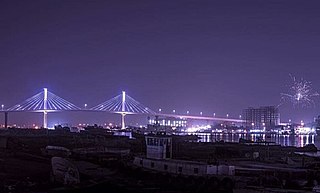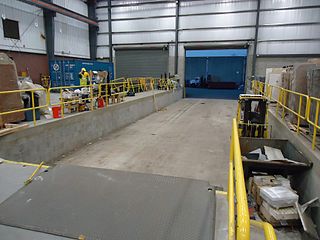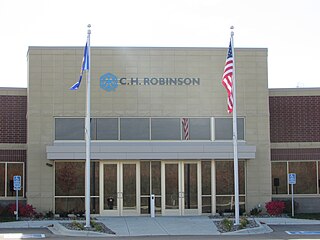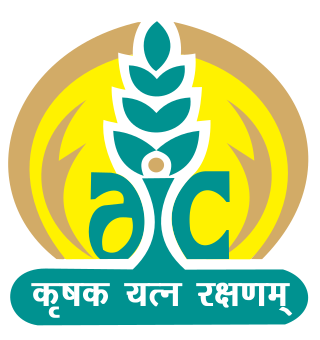
The economy of Iraq is dominated by the oil sector, which provided 89% of foreign exchange earnings in 2024. During its modern history, the oil sector has provided about 99.7% of foreign exchange earnings. Iraq's hitherto agrarian economy underwent rapid development following the 14 July Revolution (1958) which overthrew the Hashemite Iraqi monarchy. It had become the third-largest economy in the Middle East by 1980. This occurred in part because of the Iraqi government's successful industrialization and infrastructure development initiatives in the 1970s, which included irrigation projects, railway and highway construction, and rural electrification.

Logistics is the part of supply chain management that deals with the efficient forward and reverse flow of goods, services, and related information from the point of origin to the point of consumption according to the needs of customers. Logistics management is a component that holds the supply chain together. The resources managed in logistics may include tangible goods such as materials, equipment, and supplies, as well as food and other consumable items.

A warehouse is a building for storing goods. Warehouses are used by manufacturers, importers, exporters, wholesalers, transport businesses, customs, etc. They are usually large plain buildings in industrial parks on the outskirts of cities, towns, or villages.

The Mata Amritanandamayi Math (MAM) is an international charitable organization aimed at the spiritual and material upliftment of humankind. It was founded by Indian spiritual leader and humanitarian Mata Amritanandamayi in 1981, with its headquarters in Paryakadavu, Alappad Panchayat, Kollam district, kerala and is also known as amritpuri

C.H. Robinson Worldwide, Inc. is an American transportation company that includes third-party logistics (3PL). The company offers freight transportation, transportation management, brokerage and warehousing. It offers truckload, less than truckload, air freight, intermodal, and ocean transportation.

Danish Refugee Council (DRC) is a private Danish humanitarian nonprofit organization, founded in 1956. It serves as an umbrella organization for 33 member organizations.

Indian Farmers Fertiliser Cooperative Limited, also known as IFFCO, is a multi-state cooperative society engaged in the manufacture and marketing of fertiliser. IFFCO is headquartered in New Delhi, India. Started in 1967 with 57 member cooperatives, it is today the biggest co-operative in the world by turnover on GDP per capita, with around 35,000 member cooperatives reaching over 50 million Indian farmers.

Karnataka is one of the highest economic growth states in India with an expected GSDP growth of 9.5% in the 2021–22 fiscal year. The total expected GSDP of Karnataka in 2022–2023 is about $240 billion. Karnataka recorded the highest growth rates in terms of GDP and per capita GDP in the last decade compared to other states. In 2008–09, the tertiary sector contributed the most to GSDP, followed by the secondary sector, and the primary sector.

Retailing in India is one of the pillars of its economy and accounts for about 10 percent of its GDP. The Indian retail market is estimated to be worth $1.3 trillion as of 2022. India is one of the fastest growing retail markets in the world, with 1.4 billion people.

Agriculture Insurance Company of India Limited (AIC) is an Indian public sector undertaking headquartered in New Delhi. It is a government-owned agricultural insurer under ownership of the Ministry of Finance, Government of India.

Agricultural marketing covers the services involved in moving an agricultural product from the farm to the consumer. These services involve the planning, organizing, directing and handling of agricultural produce in such a way as to satisfy farmers, intermediaries and consumers. Numerous interconnected activities are involved in doing this, such as planning production, growing and harvesting, grading, packing and packaging, transport, storage, agro- and food processing, provision of market information, distribution, advertising and sale. Effectively, the term encompasses the entire range of supply chain operations for agricultural products, whether conducted through ad hoc sales or through a more integrated chain, such as one involving contract farming.

The economy of Odisha is one of the fastest growing economies in India. According to 2023–24 economic survey, Odisha's gross state domestic product (GSDP) was expected to grow at 10.57%. Odisha has an agriculture-based economy which is in transition towards an industry and service-based economy.

REC Limited, formerly Rural Electrification Corporation Limited, is an Indian public sector company which finances and promotes power projects across India. It provides loans to Central/State Sector Power Utilities in the country, State Electricity Boards, Rural Electric Cooperatives, NGOs and Private Power Developers. It is a subsidiary of Power Finance Corporation (PFC) and is under the administrative control of the Ministry of Power, Government of India.

Raniganj is a community development block that forms an administrative division in Asansol subdivision of Paschim Bardhaman district in the Indian state of West Bengal.

Galsi I is a community development block that forms an administrative division in Bardhaman Sadar North subdivision of Purba Bardhaman district in the Indian state of West Bengal.

Kanksa is a community development block that forms an administrative division in Durgapur subdivision of Paschim Bardhaman district in the Indian state of West Bengal.
The National Centre for Cold-chain Development (NCCD) is an autonomous think tank body established by the Government of India with an agenda to positively impact and promote the development of the cold-chain sector in the country. NCCD was registered under the Society Registration Act, 1860 and given sanction by the Union Cabinet of India on 9 February 2012 in a session chaired by the country's Prime Minister.

APL Logistics Ltd. (APLL) is a wholly owned subsidiary of Kintetsu World Express, Inc. (KWE), a Japan-based freight forwarding and transportation company. As a global supply chain specialist, APL Logistics trades in more than 60 countries, serving the automotive, consumer, industrials, and retail verticals. Headquartered in Singapore and USA, APL Logistics has locations across the globe.
Multi-Modal Logistics Parks (MMLPs) is a key policy initiative of the Government of India, led by National Highways Logistics Management Limited under Ministry of Road Transport and Highways (MoRTH) and the National Highways Authority of India (NHAI), to develop Multi-Modal Logistics Parks in hub-and-spoke model to improve the country's freight logistics sector by lowering overall freight costs and time, cutting warehousing costs, reducing vehicular pollution and congestion, improving the tracking and traceability of consignments through infrastructural, procedural, and information technology interventions.

Transworld Group is a multinational shipping and logistics company, based in Dubai, United Arab Emirates. It has business interests in shipping and logistics, aviation, supply chain management, and food processing, among others. Established in 1977 by R. Sivaswamy, the company has offices in the United Arab Emirates, the United States, Saudi Arabia, Oman, Sri Lanka, and multiple cities in India.
















